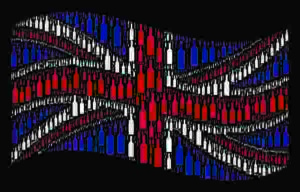Wine importing and exporting in UK will completely change post-Brexit

A deal needs to be reached by October or else from January onwards the UK will have to trade with the EU under basic rules set by the World Trade Organisation.
The UK has yet to reach a free trade deal with the EU whereby tariffs are reduced or eliminated and quotas removed.
With IWSR data showing that 44% of all wine currently consumed in the UK is of European origin a deal needs to be reached by October or else from January onwards the UK will have to trade with the EU under basic rules set by the World Trade Organisation.
What stands to change for the wine trade? IWSR recently took a look at some of the outstanding issues.
1. Bureaucracy
From January 2021 all UK and EU businesses will need to make their own Customs declarations and the UK will lose access to the EU-wide duty and tax Excise Movement Control System. Both sides will need to go to their own Customs offices and complete one Export Declaration per shipment.
VAT and Customs checks will need to be processed before freight arrives in the UK or EU and wines entering the UK will have to be labelled with the importer’s address. For now, the controversial VI-1 wine import certification, which requires all wines coming to and from the UK to undergo laboratory analysis at £330 per form, has been suspended by the UK Government – a big step towards easing the burden on trade – but this could yet change.
2. Decline in European wine consumption
Consumption of EU wine in the UK has declined by 11.6% since 2010 according to IWSR data, with still wine having dropped by 25% although sparkling has risen by 106%. This decline in wine consumption in the UK is due to people drinking less overall and a shift towards other categories including spirits, craft beer and hard seltzers, says Humphrey Serjeantson, Research Director for Western Europe at IWSR.
“How this trend continues will depend on what trade arrangements are in place,” he says, “Key factors will be tariffs, exchange rates and ease of importing – what levels of red tape exist. But I would expect the trend to continue and most likely accelerate.”
3. Higher wine prices?
Higher prices for EU wines could also drive down consumption and there are several reasons why prices could rise. A weak pound against the €uro is already making EU wines more expensive and this could get worse, explains Richard Corbett, Senior IWSR Analyst.
Should the Pound strengthen against the €uro this would work in favour of EU wines. With no EU trade deal tariffs could be implemented as the UK must then trade under WTO conditions. With a wine duty increase frozen in 2020, it might be expected that they could rise again in 2021, especially as the UK’s Chancellor looks to balance the books in a post-Covid world, pressurising prices further – the duty on a bottle of still wine is currently €2.48 (£2.23) or €3.17 (£2.86) on sparkling. There are also the bureaucratic costs that merchants will need to absorb to maintain their prices. If reintroduced, VI-1 forms could push prices up by 10p a bottle. Any rise in operating costs will ultimately be passed to the consumer.
“Prosecco has done very well in the UK over the last five years,” says Richard Corbett, “Competitive pricing has made it the everyday Champagne. Any price rise could put that segment into decline.”
4. Risk to the UK as a wine importing hub
As of 2016 the UK was the second-largest trader of wine by volume (behind Germany) and by value (behind the US), show IWSR’s data. Only a small percentage of wine exported is actually made in the UK but if it becomes harder and more expensive to import wines into the UK, its position as a global wine trading hub could be undermined.
5. English wine boom?
If the price of EU and imported wines increases, the trend towards English wines could gather pace as it becomes more competitive, believes IWSR. The bumper 2018 UK harvest will mean that producers will need to accelerate demand or find export markets.
The market for English wine will remain small but an opportunity to hammer out new trade deals could see a “surge” in exports states the report.
“The benefits for English wine may become apparent if we can agree Free Trade Agreements with other nations like Australia and the USA,” said the owner of one wine estate in England.
6. Competition from non-EU countries
If no deal is struck by next January the UK will lose trade deals struck by the EU and will have to renegotiate with major markets such as Australia. As of mid-July 2020, 19 trade deals have been rolled over from the EU to the UK, the most significant for wine being Chile, while an Australian trade deal looks promising. Chilean, Argentinian, New Zealand and Moldovan wines have captured share in recent years. This is likely to accelerate, says Richard Corbett, adding that, “Many importers will be hedging their bets by developing their non-EU portfolios”. Brexit presents Australian, South African and US wines with an opportunity to bounce back, he says, grabbing share from EU wines.
“Because of limited wine production in the UK” he concludes, “wine could be used as a lever in any trade talks with these markets and that will be a concern for EU producers.”









